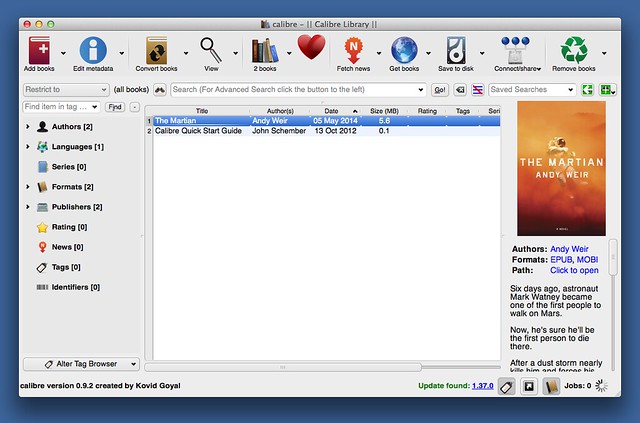How the Kindle turned me into a book pirate
May 22, 2014 at 9:50 PM by Dr. Drang
So I finally bought a Kindle a few weeks ago after years of telling myself it wasn’t worth it. Two things tipped the scales:
- My library finally has a decent number of ebooks in its collection.
- Amazon was having a great sale.
First, the sale. I learned about it through a tweet from the renowned social commentator Julia Richert:
A Paperwhite for $44 or a regular Kindle for $19… sounds good to me. Picked up one for me and one for the boy. Thanks, Amazon.
— Julia Richert (@juliainor) Apr 27 2014 9:42 AM
Of course I went the cheap route and got the $19 standard Kindle. No sense overcommitting to something new and scary, right?
I won’t waste your time telling you what I think of it, because most of you are on your third or fourth Kindle by now. Suffice it to say that it’s nice to be able to fall asleep reading and not lose my place.
As for the library, the Naperville library has offered electronic books for quite a while, but in the early days they didn’t include books in the Kindle format. So you could check out books in formats you could read on your computer (ugh), your iPhone (ugh), your iPad (don’t have one), your Nook (hahaha), or your Sony Reader (stopyourekillingme), but not on the reader that most people use.
This isn’t entirely the library’s fault. Its digital book holdings are administered by OverDrive, which must not have had an arrangement to handle Kindle books for quite a while. I’m sure the patrons of every library that used OverDrive bitched mightily about this omission until it was fixed.
You might be wondering why I don’t just buy books. My wife and I were big readers when we were younger and we both had huge book collections when we got married. The space required to hold our combined library forced us into buying (and finding room for) far more bookcases than we wanted. So we stopped buying and switched to using the library. For the most part, anyway. I have a collection of old engineering texts that I still add to a few times a year, but our everyday reading comes from the library.
Since electronic books don’t take up any space, we could go back to our old ways, but we’ve gotten used to using the library. If my wife absolutely needs something for her book club and there’s a long line of holds on the library’s copies, we buy an electronic version and she reads it on her iPad. That doesn’t happen very often.
So where does the piracy come in? Well, when I ordered the Kindle, I went to the library’s web site and put a few books on hold for it.
Unfortunately, in my eagerness to get books for my new device, I didn’t notice that The Martian didn’t come in a Kindle version. Amazon has a Kindle version, of course, but my library had only the OverDrive READ format, which is for reading in the browser (no thanks), and the Adobe EPUB format. EPUB is supposed to be an open format, but because of the digital rights management necessary to limit checkouts, I had to install Adobe Digital Editions software to access the book. And after downloading the book into ADE, what could I do with it? Read it in the ADE application on my laptop? Again, no thanks.
You probably know where this is going. Calibre is an extraordinarily ugly application that can convert digital books between several formats and will excise the DRM in the process.
I imported the Adobe EPUB version of The Martian and had a usable (which is to say pirated) version of it on my Kindle in a jiffy. I “returned” the Adobe EPUB version a few days later because there was really no reason for me to make the next person in the hold line wait any longer.
I finished the book last night and deleted it, so my reign of terror on the high seas is over. My next ebook on hold is Helene Wecker’s The Golem and the Jinni, a book I had checked out in physical form a few weeks ago but which I didn’t get around to reading before it had to be returned. It’s already in Kindle form, so I won’t have to resort to Calibre.
Unless I’m slow in getting through it, in which case Calibre’s DRM-stripping may buy me some extra time to finish it. Once you get a taste of the freebooting life, it’s hard to go back.
-
I will not rail against the idea that there are a set number of copies of an electronic book. We all know why the library has to limit the number of checkouts of electronic books. Eventually, copyright law will catch up with digital media, but that hasn’t happened yet. ↩

